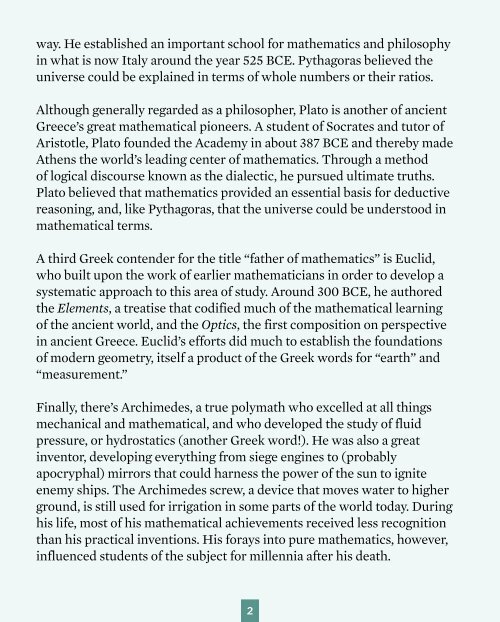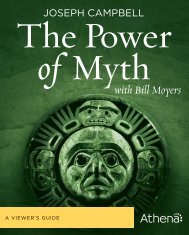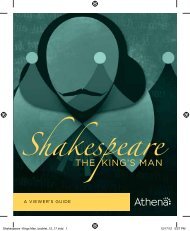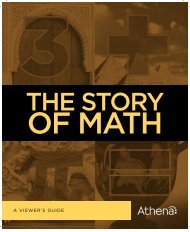THE CODE - Athena
THE CODE - Athena
THE CODE - Athena
You also want an ePaper? Increase the reach of your titles
YUMPU automatically turns print PDFs into web optimized ePapers that Google loves.
way. He established an important school for mathematics and philosophyin what is now Italy around the year 525 BCE. Pythagoras believed theuniverse could be explained in terms of whole numbers or their ratios.Although generally regarded as a philosopher, Plato is another of ancientGreece’s great mathematical pioneers. A student of Socrates and tutor ofAristotle, Plato founded the Academy in about 387 BCE and thereby madeAthens the world’s leading center of mathematics. Through a methodof logical discourse known as the dialectic, he pursued ultimate truths.Plato believed that mathematics provided an essential basis for deductivereasoning, and, like Pythagoras, that the universe could be understood inmathematical terms.A third Greek contender for the title “father of mathematics” is Euclid,who built upon the work of earlier mathematicians in order to develop asystematic approach to this area of study. Around 300 BCE, he authoredthe Elements, a treatise that codified much of the mathematical learningof the ancient world, and the Optics, the first composition on perspectivein ancient Greece. Euclid’s efforts did much to establish the foundationsof modern geometry, itself a product of the Greek words for “earth” and“measurement.”Finally, there’s Archimedes, a true polymath who excelled at all thingsmechanical and mathematical, and who developed the study of fluidpressure, or hydrostatics (another Greek word!). He was also a greatinventor, developing everything from siege engines to (probablyapocryphal) mirrors that could harness the power of the sun to igniteenemy ships. The Archimedes screw, a device that moves water to higherground, is still used for irrigation in some parts of the world today. Duringhis life, most of his mathematical achievements received less recognitionthan his practical inventions. His forays into pure mathematics, however,influenced students of the subject for millennia after his death.After the GreeksBy the first century BCE, Rome had conquered Athens—along with most ofwhat is now modern Greece—and Greek advances in mathematics came toan abrupt end. Rome shared none of the Greeks’ philosophical fascinationwith numbers, and for the practical Romans mathematics had purelypractical ends. For a thousand years, European traders and bureaucratswould have to work with a clumsy system of Roman numerals based on theletters of the Roman alphabet.Although the Romans were heirs to Greek civilization in so many otherareas, the Arabs of the Near East and North Africa took up that mantle formathematics. They added their own contributions—the words “algorithm”and “algebra” have Arabic roots—while also serving as a bridge to Easternlearning, bringing to the West breakthroughs from India such as the Hindu-Arabic system of numerals, trigonometric tables, and the concept of zero.In the centuries after the fall of Rome in 476 CE, Europe slid into adark age, during which the study of mathematics stagnated in the West.For monastics in Europe, the main application of mathematics was todetermine what day Easter would fall on. Eventually, trade with the Eastbrought exposure to earlier texts as well as newer works from the Islamicworld and, at the same time, an increased practical need for mathematicsfrom those engaged in commerce.The fall of Constantinople to the Ottomans in 1453 led to a further rebirthof classical learning in Europe. Greek scholars fleeing the Byzantinecapital brought with them many ancient manuscripts, which theircounterparts in Western Europe could now study firsthand. At the sametime in Europe, the development of the printing press helped disseminatethis newfound knowledge, allowing mathematics to regain its place as afoundational subject for the world.23















